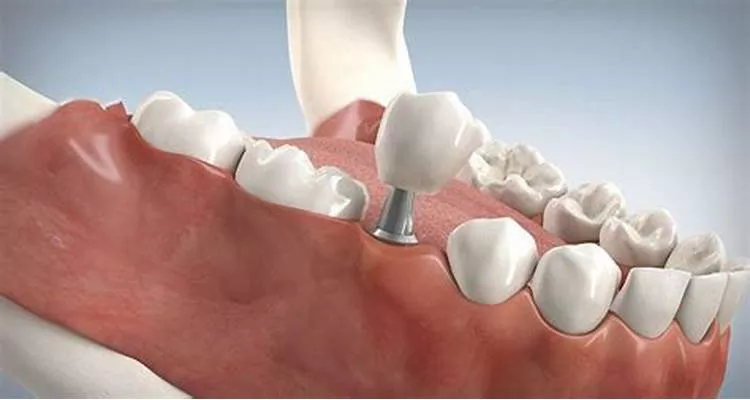Periodontal disease, often referred to as gum disease, is a prevalent condition affecting millions of people worldwide. It is characterized by inflammation and infection of the gums and, if left untreated, can lead to tooth loss and other serious health complications. Dental implants, on the other hand, are a popular and effective treatment for replacing missing teeth.
But can dental implants actually cure periodontal disease? Let’s delve into this topic to understand the relationship between dental implants and periodontal disease management.
Understanding Periodontal Disease
Periodontal disease begins with the buildup of plaque, a sticky film of bacteria that forms on teeth. When plaque hardens into tartar (calculus), it can irritate and inflame the gums, causing gingivitis. Gingivitis, if not addressed, can progress to periodontitis, where the infection moves deeper into the gums and can eventually affect the bone supporting the teeth.
Symptoms of periodontal disease include:
- Persistent bad breath
- Red, swollen gums
- Tender or bleeding gums
- Painful chewing
- Loose teeth
The Role of Dental Implants
Dental implants are artificial tooth roots made of titanium that are surgically placed into the jawbone beneath the gum line.
They serve as a sturdy base for replacement teeth such as crowns, bridges, or dentures. Dental implants offer several advantages, including improved aesthetics, function, and comfort compared to traditional dentures or bridges.
see also: What Body Systems Are Affected by Periodontal Disease
Can Dental Implants Cure Periodontal Disease?
It’s crucial to clarify that dental implants do not cure periodontal disease. Once periodontal disease has progressed to the point where teeth are lost or need to be extracted due to severe gum and bone damage, dental implants become a viable treatment option for replacing those teeth. However, the implants themselves do not treat or reverse the underlying gum disease.
Managing Periodontal Disease Before Implant Placement
Before considering dental implants, it is essential to manage and stabilize periodontal disease. This typically involves professional dental treatment, including:
Scaling and Root Planing: A deep cleaning procedure to remove plaque and tartar from below the gum line.
Periodontal Maintenance: Regular dental visits for professional cleanings and ongoing monitoring of gum health.
Bone Grafting: In cases where the jawbone has deteriorated due to periodontal disease, bone grafting procedures may be necessary to strengthen the bone for implant placement.
Antibiotic Therapy: Sometimes, antibiotics may be prescribed to control bacterial infection in the gums and bone.
Why Implants Are Beneficial After Periodontal Disease
Once periodontal disease is under control and any necessary extractions are performed, dental implants can provide a stable and durable solution for replacing missing teeth. Unlike natural teeth, dental implants are not susceptible to decay or periodontal disease because they are made of materials that are not affected by oral bacteria. However, proper oral hygiene practices and regular dental check-ups are still crucial to maintaining the health of the gums and surrounding tissues.
Conclusion
In conclusion, while dental implants are an excellent option for replacing teeth lost due to periodontal disease, they do not cure the disease itself. Effective management of periodontal disease through professional dental care is essential before considering dental implants. If you are experiencing symptoms of gum disease or have lost teeth due to periodontal disease, consult with a qualified dental professional who can provide a comprehensive evaluation and recommend the best treatment options tailored to your oral health needs. Early intervention and proper maintenance are key to preserving your smile and overall oral health for years to come.
FAQs
Should You Get Implants If You Have Periodontal Disease?
Answer: Generally, it is not advisable to get dental implants if you currently have active periodontal disease. Successful implant placement requires healthy gums and sufficient bone density. If you have untreated periodontal disease, the infection can compromise the stability of dental implants and increase the risk of implant failure. Therefore, it is crucial to first manage and stabilize the periodontal disease through treatments such as scaling and root planing, antibiotics, and possibly surgical interventions like bone grafting. Once the gum and bone health are restored, dental implants can be considered as a treatment option.
What Is the Best Teeth Replacement for Periodontal Disease?
Answer: The best teeth replacement for individuals with periodontal disease often depends on the extent of the disease and the condition of the remaining teeth and bone structure. Here are some options:
Dental Implants: Once periodontal disease is under control, dental implants are considered one of the best options due to their stability, durability, and natural feel. They help preserve jawbone density and provide a secure foundation for replacement teeth.
Fixed Dental Bridges: For those with a few missing teeth, a dental bridge anchored to adjacent teeth may be an option.
However, this requires healthy supporting teeth, which may not be feasible in cases of advanced periodontal disease.
Removable Dentures: These are a traditional option but may not provide the same comfort or functionality as dental implants. They are often used when implants are not viable due to bone loss.
All-on-4 Implants: This is a treatment option where a full arch of teeth is supported by just four implants. It is particularly beneficial for patients with significant bone loss, as it can often be done with minimal bone grafting.
Will Periodontal Disease Go Away When Teeth Are Removed?
Removing teeth affected by periodontal disease does not cure the disease. The infection and inflammation are localized to the gum tissues and bone, so simply extracting the teeth does not eliminate the underlying disease process. After tooth removal, it is essential to continue treating the periodontal disease to prevent further infection and bone loss.
Following extraction, treatments such as antibiotics, periodontal cleaning, and possibly bone grafting or soft tissue grafts may be necessary to restore health and prepare the site for potential tooth replacement options like dental implants.

